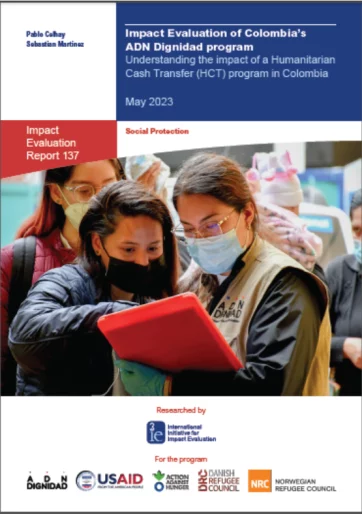Understanding the Impact of a Humanitarian Cash Transfer (HCT) Program in Colombia
The Venezuelan humanitarian crisis represents one of the largest displacement crises in the world, on the order of 6.1 million people (UNHCR 2022a). Colombia currently hosts more than 1.82 million Venezuelans, 60 percent of whom are in irregular situations that prevent them from accessing public services, putting a strain on the Government of Colombia’s (GOC’s) capacity to deliver essential social and legal assistance (UNHCR 2022a). Venezuelan migrants and Colombian returnees arriving in Colombia are generally poor and have few coping strategies at their disposal to support their integration. This is particularly the case in the poor neighborhoods that host mixed migrants, with increasingly greater competition for scarce resources and opportunities within receptor communities.
Understanding how to effectively support these displaced populations has become imperative. To this effect, cash transfers are well established as an effective development tool. However, little is known about their effectiveness in aiding the displaced population in the context of the Venezuelan crisis. This study contributes to filling this gap, answering critical questions about the effectiveness of unconditional cash transfers for improving the lives of displaced individuals and their households.
This report presents the results of the impact evaluation of ADN Dignidad. The ADN Dignidad Program is implemented by the Cash for Urban Assistance (CUA) Consortium, led by Acción Contra el Hambre in partnership with the Danish Refugee Council (DRC) and the Norwegian Refugee Council ( NRC), with funding from USAID’s Bureau for Humanitarian Assistance (BHA). The program aims to improve access to basic food, non-food items, and shelter through the provision of up to 6 months of unconditional multipurpose cash assistance (MPCA) transfers of approximately $100 USD per recipient household per month ($34 USD/person per month, or $206 USD/person over 6 months) to approximately 220,000 crisis-affected individuals. To leverage the impact of the MPCA, the project integrates targeted messaging aimed at maximizing the nutritional impact of the MPCA transfers. The program also strives to improve the overall protective environment for target groups by increasing their awareness of locally available and legally accessible social protection (education, health, social protection, etc.) and legal services.
To estimate the impact of ADN Dignidad, we implement a Regression Discontinuity Design (RDD). In this setting, we exploit the eligibility rule of the program that assigns scores to each applicant based on household characteristics at the time of application. We assess the vulnerability of each household through a sociodemographic and economic characteristics survey, and assign two scores to each application. We define a threshold and households that are above a threshold of vulnerability on either score are eligible to receive the assistance. The RDD establishes the program’s impact by comparing outcomes of applicants who are just above and below an eligibility threshold of both scores. As such, the impacts estimated in this report apply to the pool of applicants with boarder line eligibility scores—those with the lowest vulnerability scores among eligible applicants. We analyze short-term impacts using cross-sectional data on 3,190 applicants collected between 1 to 3 months after program graduation (7 to 9 months after application for non-participants) in the areas of Barranquilla, Bogota, and Nariño.
Results show that uptake of the ADN Dignidad program is near universal, and most participants would be unable to substitute this source of support for MPCA from other programs. As a result of the program, participants have increased savings, are less likely to hold debt, and are more likely to invest in business tools. The program led to increases of 3.7 hours of work per week and 13.8 percent over the control group. One to three months after the program ended, participants report a sustained increase in income, roughly 15 percent higher than the comparison group. We find large and significant effects of the intervention on reducing both the severity and prevalence of food insecurity coping strategies and food consumption practices participants adopted in emergency situations. Finally, ADN Dignidad increased participants’ subjective well-being by reducing insecurity and improving life satisfaction.
Taken together, the evidence points to economically large and statistically significant impacts of ADN Dignidad on improved quality of life for Venezuelan migrants and Colombian returnees. Assuming impacts are sustained over time, a simple comparison of the economic benefits relative to program costs suggests a positive return on investment within 3 years from increased working hours alone. These results are particularly notable when accounting for the nature of the RDD impact estimates among the “least vulnerable” of a highly vulnerable population the program targets. While we are unable to assess impacts on participants with higher vulnerability scores, the results found in this study are arguably lower-bound estimates—positive impacts are sustained to various degrees among more vulnerable populations. The results also suggest that expanding the program’s eligibility criteria to applicants with lower vulnerability scores is a promising effective strategy for improving the well-being of those currently ineligible for the program.



